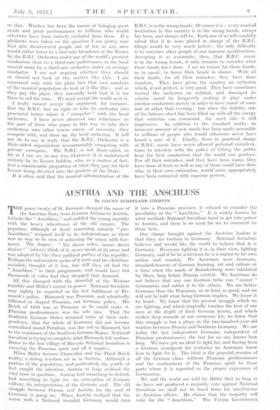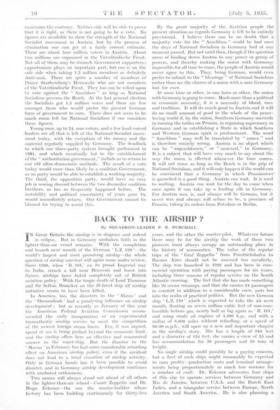AUSTRIA AND THE ANSCHLUSS
By COUNT FERDINAND CZERNIN
THE peace treaty of St. GerMain changed the name of the Austrian State from German Austria to Austria, forbade the " Anschluss," and saddled the young republic with the heavy inheritance of the old empire. The populace, although at heart remaining entirely " pro- Anschluss," resigned itself to its independence as there was no way to be seen of achieving the union with Ger- many. The slogan : " Nie davon reden, immer daran denken ! " (always think of it, never speak of it) arose and was adopted by the three political parties of the republic. Perhaps the nationalists spoke of it more and the christian- socialists thought of it less, but still they all had the " Anschluss " in their programme, and would have lost thousands of votes had they dropped that demand. All this changed with the downfall or the Weimar republic and Hitler's ascent to power. National Socialism may rightly be regarded as the last fulfilment of Bis- marck's policy. Bismarck was Prussian, and admittedly followed or shaped Prussian, not German, policy. His Reich of 1870 was as Prussian as he could make it. Prussian predominance was his sole aim. That the Southern German States retained some of their inde- pendence, that the whole of Germany did not become centralized round Potsdam, was due not to Bismarck but to the resistance of the Southern German States. National Socialism is trying to complete what Bismarck left undone. Down to the last village of Bavaria National Socialism is carrying the Prussian spirit and all it implies. When Hitler became Chancellor and the Third Reich reality, a strong reaction set in in Austria. Although a portion of the population, and particularly the youth, at first caught the infection, Austria at large realized the vital issue in question. Austria had something to defend, had something to fight for—its conception of German culture, its interpretation of the German soul. The old struggle between Prussia .and Austria for the soul of Germany is going on. When. Austria realized that the union with a National Socialist Germany would turn it into a Prussian province, it refused to consider the possibility of the " Anschluss." It is • widely known by what niethods National Socialism tried to get into power in Austria, and there is no need for me to comment on them here.
One charge brought against the Austrian leaders is that they are traitors to Germany. National Socialism believes and would like the world to believe that it is Germany. Everyone lighting it is, in their view, fighting Germany, and if he be a German he is a traitor to his own nation and country. We Austrians were Germans, standard-bearers of German learning, art and culture at a time when the sands of Brandenburg were inhabited by Slays, long before Prussia existed. We Austrians do not believe that any one German- tribe can " corner " Germanism and sublet it to the others. We are better Germans than the Prussians, or at least as good, and we will not be told what being German implies. We know it by heart. We know that the present struggle which we are fighting, and which tragically touches the best of our men at the depth of their German hearts, and which strikes deep wounds at our economic life, we know that this struggle is but a phase in the two-hundred-year-old warfare between Prussia and Southern Germany. We are today the last independent Germans, independent of Prussian predominance, the last for no one knows how long. We have got an ideal to fight for, and having been a .German avantgarde for centuries we Austrians know how to fight for it. The ideal is the peaceful reunion of all the German clans without Prussian predominance and the confinement of the Prussian spirit to .those parts where it is regarded as the proper expression of Germanism.
We and, the world are told by Hitler that as long. as we have not. produced .a majority vote against National Socialism we shall not be freed from his interference in Austrian affairs. He claims that the majority will vote for the " Anschluss," The Vienna Government maintains the contrary. Neither side will be able to prove that it is right, as there is not going to be a vote. No figures arc available to show the strength of the National Socialist movement in Austria, but by the process of elimination one can get at a fairly correct estimate. There are about four million voters in Austria. About two millions are organized in the Vaterkindische Front. Not all of them may be staunch Government supporters ; opportunism plays an important part, but one is on the safe side when taking 1.5 million members as definitely Anti-nazi. There are quite a number of members of Prince Starhemberg's Heimwehr who are not members of the Vaterlandisehe Front. They too can be relied upon to vote against the " Anschluss " as long as National Socialism governs the Reich. At the last general election the Socialists got 1.5 million votes and there are few amongst them who would prefer the present German form of government to ours. There does not seem to be much room left for National Socialism if one considers these figures.
Young men, up to 24, non-voters, and a few loud-voiced leaders are all that is left of the National-Socialist move- ment today, with the exception of the money and the material regularly supplied by Germany. The deadlock to which our three-party system brought parliament in 1931, and which eventually led to the establishment of the " authoritarian government," forbids us to return to our old ultra-democratic methods. The result of a vote today would more than likely be a coalition Government, as no party would be able to establish a working majority. The third, the opposition party, would have an easy job in sowing discord between the two dissimilar coalition brothers, as has so frequently happened before. The instability and political uncertainty of years gone by would immediately return. Our Government cannot be, blamed for trying to avoid this. By. the great majority of the. Austrian people the present situation as regards Germany is felt to be entirely provisional. I believe, there can be no doubt that a majority vote for the " Anschluss ." • could be had once the days of National Socialism in Germany had at any moment passed. But not until.then, though if the question arose of binding down Austria to any power or group of powers, and thereby making the union with Germany impossible for all time to come, the people of Austria would never agree to this. They, being German, would' even prefer to submit to the " blessings " of National Socialism rather than see the chance of a union with a sane Germany lost for ever, At some time or other, in one form or other, the union with Germany is going to come. Much wore than a political or economic necessity, it is a necessity of blood, race and tradition. It will do much good to Austria and it will do no small amount of good to the whole of the peace- loving world if, by the union, Southern Germany, succeeds in turning the tables on Prussia, in:regaining supremacy in Germany. and in establishing a State in which Southern and _Western German spirit is predominant. The word " Anschluss " may well be translated by " annex and is therefore, entirely wrong. Austria is no object which can be ," angeschlossen," or "annexed,". to Germany, It,is a subject, that will have, very much to say about the, way the union, is effected whenever the time comes. It will not come as long as the Reich is in the grip of National Socialism, and it will only happen if the world can be convinced that a Germany in which Prussianism' is quenched is a good thing. Austria can wait. It is used to. waiting. Austria can wait for the day to come when once again it can take up a leading role in Germany. For Austria was, is, and always will be German, but it never was and always will refuse to be, a province of Prussia, taking its orders from Potsdam or Berlin.















































 Previous page
Previous page